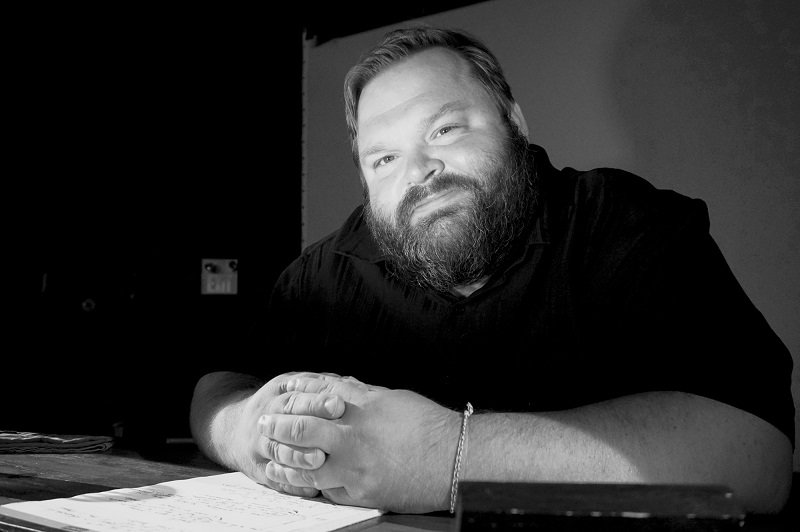 |
| Photo of Mike Daisey from mikedaisey.com |
But here he was, Tuesday night, at the Ashby Stage in Berkeley, at the confluence of a bunch of events. The Shotgun Players are in the middle of a run of Christopher Chen's play "Caught," which was inspired at least in part by the kerfuffle with Daisey on NPR when his piece about Steve Jobs and Apple was adapted for "This American Life." And apparently Mr. Trump is running for president. And Daisey is doing a tour of his Trump monologue, so it's only fitting that he'd sweep into town for two quick shows.
Background
I should note that I blogged several times about Daisey and the fuss with NPR back when it happened in early 2012. I think the most interesting piece is this one, because it both discusses the outcome of the show and links to several other commentaries. I won't go into detail here, since I've already written about it.But Trump and Daisey is kind of an irresistible combination. Big, loud, guys from New York who don't just march to their own drummers, they are their own drummers.
I first became aware of Mike Daisey and his work when he came to Berkeley with his monologue (which was also published in book form), "21 Dog Years," about working in customer service for Amazon.com during the dot-com boom. We've since seen a number of his other pieces, including the controversial one about Apple. I like the fact that Daisey is always entertaining and thought-provoking, and because he has a very theatrical take on the ancient art of story telling.
The Art of the Story
Indeed, rereading my pieces from several years ago about the NPR controversy, what strikes me is that my favorite parts dealt with the role of story telling in general. Stories are the basis of culture, but also the basis of communication. We perhaps like to think we communicate with facts and ideas, but it is in fact stories that tie those together and enable human minds to absorb them.Which (finally) brings me back to "The Trump Card." Daisey makes clear from the get-go that he is a story teller, a monologist, and a theater person, so he is, by his own admission, a professional liar. Now maybe that's just a clever disclaimer to ward off the hounds at NPR, but it also establishes his bona fides, because if it takes one to know one, he certainly recognized the professional liar and performer in Donald Trump.
He walks us through the history of the Trump family, most of which is probably familiar to anyone who has been paying attention for the last year or two. We get the stories of Trump's father, Fred, the slum lord and racist who was known for never paying people what they were owed. It becomes quite clear that the fruit didn't fall far from the tree. But always, Trump is telling his story, his version of "reality."
The Game
Among my favorite bits in the monologue is the description of Daisey hosting a big party, serving (fake) Trump Steaks to his friends while they play "Trump: The Game," which is, he says, like Monopoly for dogs. It sounds like a mind-numbingly awful game, but it also speaks volumes about the eponymous brand.The Characters
In addition to the Trumps, of course, we also get to hear about Trump's longtime lawyer and advisor, Roy Cohn. That's pretty chilling stuff, but again, not so new.I thought my favorite insight was when Daisey mentioned that as a monologist, he has spent much of his career developing and honing the character he plays on stage every night, "Mike Daisey." Because he says that's just what Trump has spent basically his entire career doing, too, at least since his businesses all pretty much tanked in the 1990s. It's all one long "reality" show, where Donald Trump plays the role of "Donald Trump."
And this might be the most useful insight: the fact that, no matter how much we think we know about Donald Trump, we really only know "Donald Trump." How much that distinction matters is left as an exercise for the reader, but Daisey makes it clear from the outset that we are all in deep trouble. And he also makes clear that even if "Donald Trump" is vanquished (or at least, defeated at the polls), we will eventually encounter someone who plays the role even better, and there the real trouble sets in.
The Script
I should note that if you can't get to see Daisey do the monologue, you can at least read it. You can download the whole thing here. In fact, you can read it out loud, if you like: It's open sourced. You, too, can play the role of "Mike Daisey" if you like. He has also released the script for "The Agony and Ecstasy of Steve Jobs" the same way.If you're interested, a lot of his work is also recorded and available as a podcast, "All Stories are Fiction". It's all explained on his website.
The Evaluation
Obviously, this is a very timely work, which is why Daisey is on a whirlwind tour between now and the election. And it's clearly a work he cares a lot about. At over two hours, it's a bit long, and somewhat repetitive. It strikes me that this might be the first show I've seen since Daisey split with his wife, who used to direct and co-create a lot of his work. That might account for some of the difference. It's good, but not really his best work.I'll drop a link here to a review of some earlier workshop performances of the piece in Washington, DC, last summer. It probably gives a better flavor of the actual content of the show.
